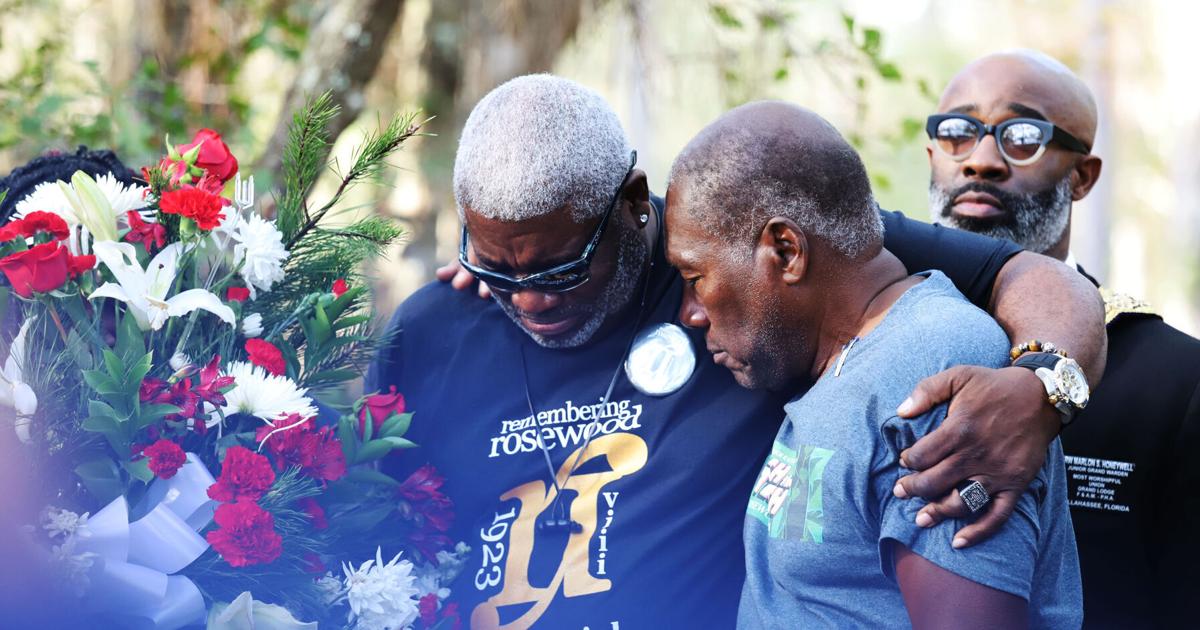Florida
A Florida Man Was Found Guilty Of A Racially Motivated Assault On Six Black Men Near The Site Of The Rosewood Massacre In 1923.

Rosewood Massacre In 1923: For his racially motivated assault on a group of Black men in Rosewood, Florida, David Emanuel was sentenced to one year and a day in prison and two years of supervised release. Authorities have condemned the event, which happened near the 1923 Rosewood Massacre, emphasizing the need to combat hate crimes in modern society.
Assistant Attorney Kristen Clarke of the Justice Department’s Civil Rights Division condemned racially motivated hate crimes. Emanuel’s vehicle assault on a group of Black men was seen as a blatant insult to American principles.
Hate crimes are severe, and Northern District of Florida U.S. Attorney Jason R. Coody said they have no place in the state or nation. Law enforcement authorities condemn race-based violence and are committed to rigorously investigating and punishing civil rights offenses to achieve justice for hate victims.
Emanuel was convicted after a successful trial thanks to the FBI Jacksonville Field Office, Gainesville Resident Agency, and Levy County Sheriff’s Office. The evidence showed that Emanuel used racist obscenities and expletives when he saw the gathering of six elderly or adult Black males on a public road before driving his vehicle at them, just missing one. A witness said Emanuel admitted to trying to hurt the people on the scene, confirming his racially tinged motive.
The incident caused no bodily casualties, but it had a significant psychological effect on the victims and society. FBI Jacksonville Field Bureau Special Agent in Charge Sherri E. Onks emphasized the FBI’s priority in investigating hate crimes, noting their effect on communities and the need for victim justice.
David Emanuel’s Punishment Reinforces The Community’s And Beyond’s Fight Against Hatred And Prejudice.
The case was prosecuted by Assistant Attorneys Kaitlin Weiss and Frank Williams for the Northern District of Florida and Civil Rights Division Criminal Section Trial Attorney Laura-Kate Bernstein.
Racially Motivated Hate Crimes’ Impact
After being jailed for racially assaulting a group of Black males in Rosewood, Florida, David Emanuel was criticized for racism. The occurrence near the 1923 Rosewood Massacre site has rekindled questions about racial prejudice in modern society. The case highlights the necessity for comprehensive measures to counteract racism’s deep-rooted repercussions of violence and discrimination.
Assistant Attorney Kristen Clarke of the Justice Department’s Civil Rights Division called racially motivated hate crimes harmful to the US’s values of equality and tolerance. The evidence showed that Emanuel drove his vehicle toward the Black guys, using racist insults and expletives. Despite minimal physical injuries, the victims and the Black community suffered mental anguish. The event highlights the ongoing struggle to remove racial discrimination and ensure the safety and dignity of all people, regardless of race.
Laws Against Hate Crimes
After the unsettling occurrence, U.S. Attorney Jason R. Coody for the North District of Florida stressed the gravity of hate crimes and pledged to end them in the state and country. In this case, the FBI Jacksonville Field Office, Gainesville Resident Agency, and Levy County Sheriff’s Office worked together to seek justice. Emanuel’s conviction was a significant step in punishing racially motivated crimes and providing justice for victims and the community.
Committed attorneys pursued the case, including Assistant U.S. Attorneys Kaitlin Weiss and Frank Williams for the Northern District of Florida and Civil Rights Division Criminal Section Trial Attorney Laura-Kate Bernstein. Law enforcement and judicial institutions are committed to fighting hate crimes and protecting civil rights for all races and ethnicities.
Community Response And Solidarity Call
Hate crimes target victims and intimidate and harm whole communities, according to FBI Jacksonville Field Office Special Agent in Charge Sherri E. Onks. The FBI has prioritized hate crime investigations due to their insidious nature and the need to promote community safety and inclusion.
New demands for unity and solidarity against racial prejudice have followed the tragedy. Community leaders and campaigners have stressed the significance of promoting tolerance and understanding without bias. The sentence of David Emanuel highlights the continuous fight against systematic racism and guarantees that all people may live without race-based discrimination or violence. This case emphasizes the necessity to encourage tolerance, equality, and social justice to create a diverse, respectful society.
Rosewood Massacre: History And Racial Trauma’s Legacy
The occurrence near the 1923 Rosewood Massacre reminds Americans of Black communities’ previous tragedies. Racially motivated violence destroyed a rich Black community in Florida’s Rosewood Massacre. The latest assault on the Black males shows that institutional racism’s scars endure decades after. While racial inequality and social justice have improved, the incident underlines the need to face past injustices and help oppressed populations.
Read Also: The Long-Term Effects Of Florida’s War On Books And Black History On Education
Fighting Racism Through Education And Community Empowerment
After the horrific occurrence, community leaders and activists have called for comprehensive racism education. Education on the history of racial prejudice, its current forms, and the need for an inclusive and fair society promotes empathy and respect. Community resilience and systemic racism prevention are also strengthened by community empowerment programs that benefit disadvantaged populations. Education, resources, and support networks may enable communities to create a more equivalent and inclusive environment where everyone can prosper without prejudice or violence.
Healing Racial Wounds With Restorative Justice
The sentence of David Emanuel highlights the need for restorative justice in mending communities and resolving racial traumas. Therapeutic justice techniques that emphasize responsibility, reconciliation, and healing may help victims and offenders address racial violence. Beneficial justice systems allow people to address the core causes of racial conflict and establish a more fair and equitable society via discourse, mediation, and community participation. Restorative justice may help communities recover from racially motivated crimes and develop a community that values diversity and respects everyone.













You must be logged in to post a comment Login